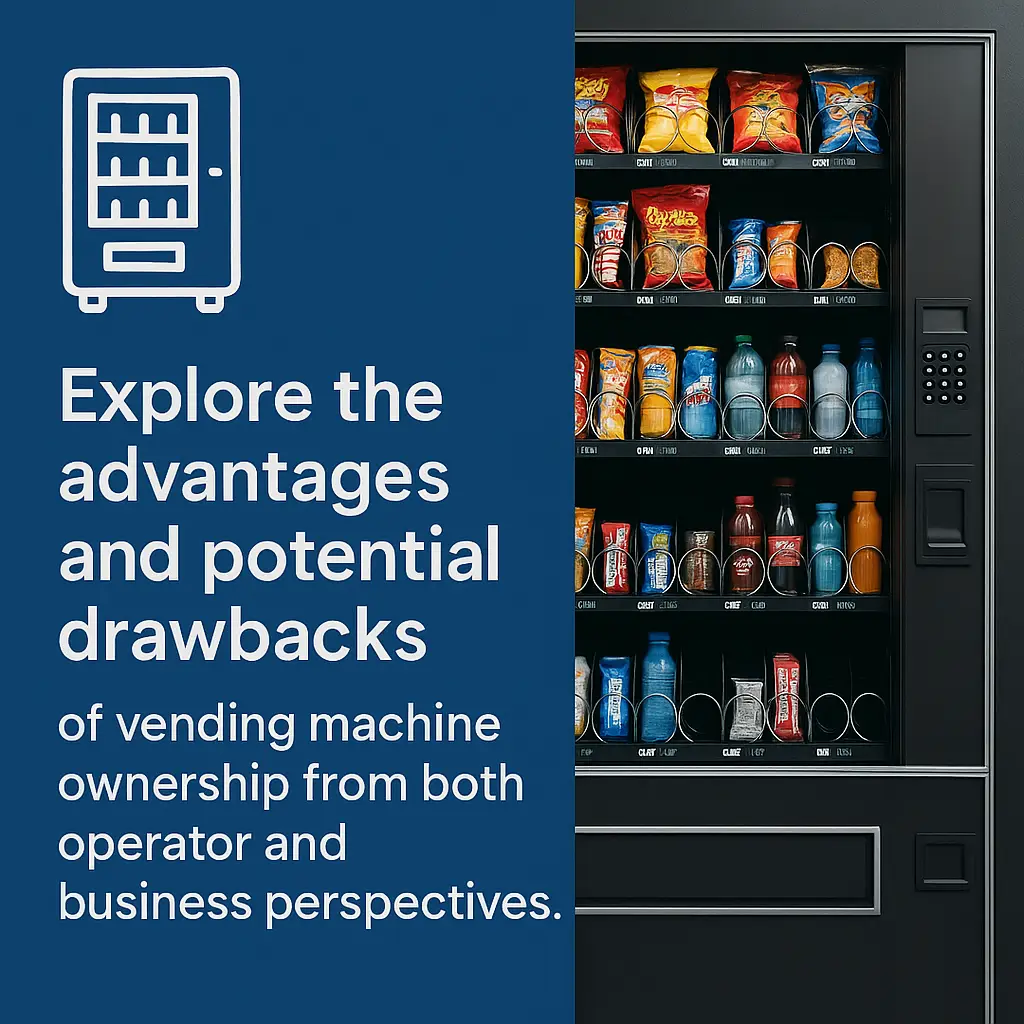Pros and Cons of Owning a Vending Machine
Explore the advantages and potential drawbacks of vending machine ownership from both operator and business perspectives.
Back to Vending Business Startup ResourcesExplore the advantages and potential drawbacks of vending machine ownership from both operator and business perspectives.
Back to Vending Business Startup ResourcesStart your 30-day free trial and get instant SMS and email alerts whenever a local business needs vending service. These are real location leads to help you grow your route — you decide which ones to buy, no obligations or contracts.
![]() Minimal overhead compared to traditional retail businesses
Minimal overhead compared to traditional retail businesses
![]() Requires less daily involvement than full-time businesses
Requires less daily involvement than full-time businesses
![]() Location is key to long-term vending success
Location is key to long-term vending success
30 days free, then $39 / month.
No Commitment. Cancel Anytime.

Vending machine ownership offers an attractive business model for entrepreneurs seeking flexibility, minimal overhead, and passive income potential. With relatively low startup costs and few staff requirements, it's often seen as a low-risk way to generate recurring revenue. However, like any business, it comes with its challenges.
Pros: One of the biggest advantages of owning a vending machine is the ability to generate income with minimal day-to-day involvement. Vending routes can be managed part-time, and smart machines equipped with telemetry technology allow remotely monitoring inventory and performance. Once placed in the right locations—such as offices, schools, or apartment buildings—machines can turn steady profits.
Startup costs are also manageable. Entry-level combo machines can cost between $3,000 and $6,000, and financing options are available. Owners can scale their business incrementally by reinvesting profits into additional machines. Cashless payment systems and healthy product selections continue to attract more customers, especially in workplace settings.
Cons: That said, challenges include finding high-traffic locations and keeping machines fully stocked, clean, and functional. Breakdowns can lead to revenue loss, and maintenance is the responsibility of the owner. Product theft or machine vandalism may also be a concern in some public-facing placements. Location agreements may involve negotiation and fees for space rental or commissions.
It's important to assess whether you'll self-manage or outsource servicing, and to understand local vending laws and taxes. Profit margins depend on volume, not per-unit sales, so low-traffic locations rarely succeed, regardless of product quality.
Vending can be a rewarding venture with the right strategy. Placement, product mix, and consistency in customer service all impact long-term success. For tips on making strong proposals to secure premium locations, review our guide on how to create an effective vending machine proposal.
If you're planning to scale your operation, it's useful to understand what constitutes success. See our resource on how many locations are needed to reach profitability.
Vending Exchange connects vending operators with real businesses actively looking for vending services—including traditional machines, AI coolers, and office coffee. Get instant SMS and email alerts when new opportunities are available in your area. No contracts or monthly fees—just buy the leads you want. Start your free 30-day trial today and grow your vending business on your terms.
Profits vary based on location and product, but typical machines earn $75–$300 per month.
Startup costs range from $3,000 to $10,000 per machine, depending on type and features.
It can be semi-passive. Machines operate independently, but restocking and maintenance are required.
As the owner, you're responsible for repairs or coordination with a technician to minimize downtime.
High-traffic areas like schools, offices, and apartments are ideal. Approach property managers with a proposal.
Yes, most cities require a local business license and may have regulations around sales tax reporting.
Yes, some services offer managed maintenance, but this reduces your profit margin slightly.
Restocking needs depend on traffic—some require weekly visits, others bi-weekly or monthly.
Some property managers request a percentage of sales; others allow placement for free as an amenity.
Yes, cashless payments and smart alerts improve efficiency, inventory tracking, and the customer experience.